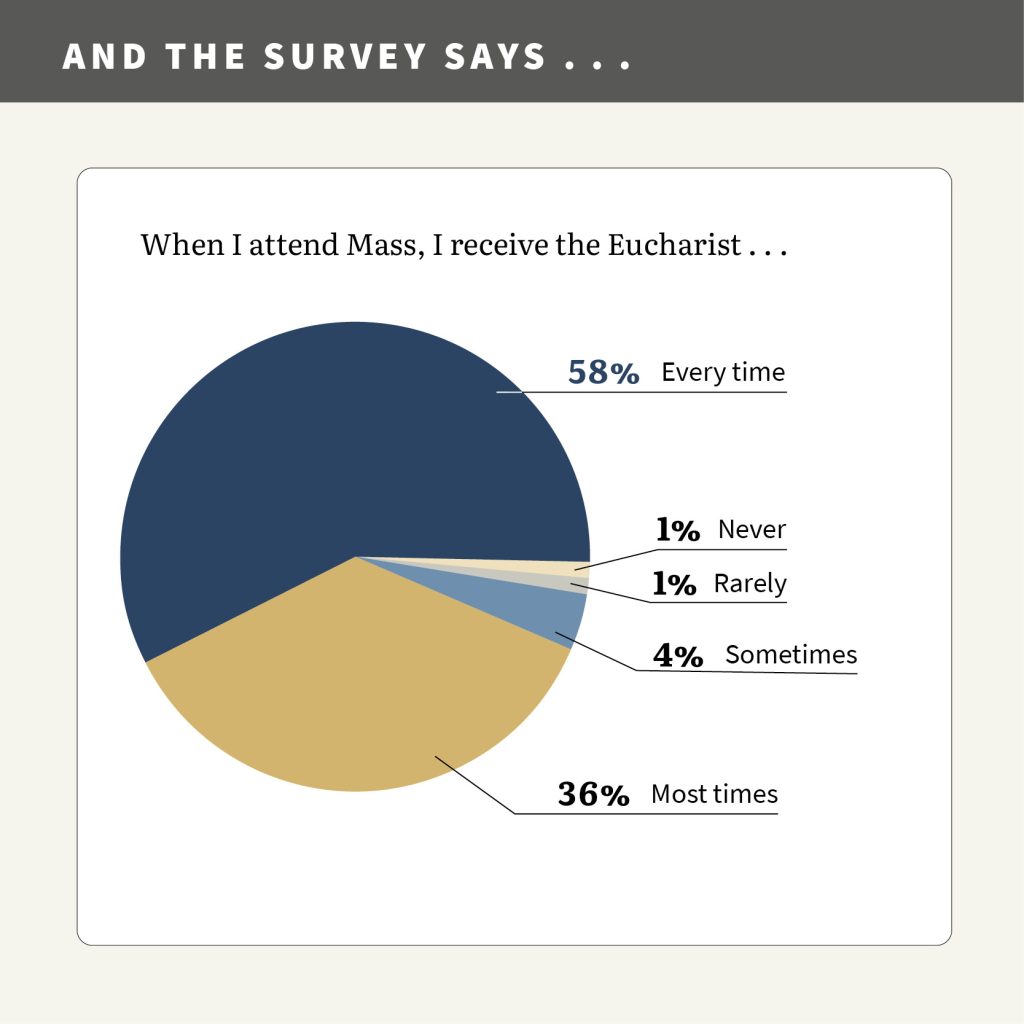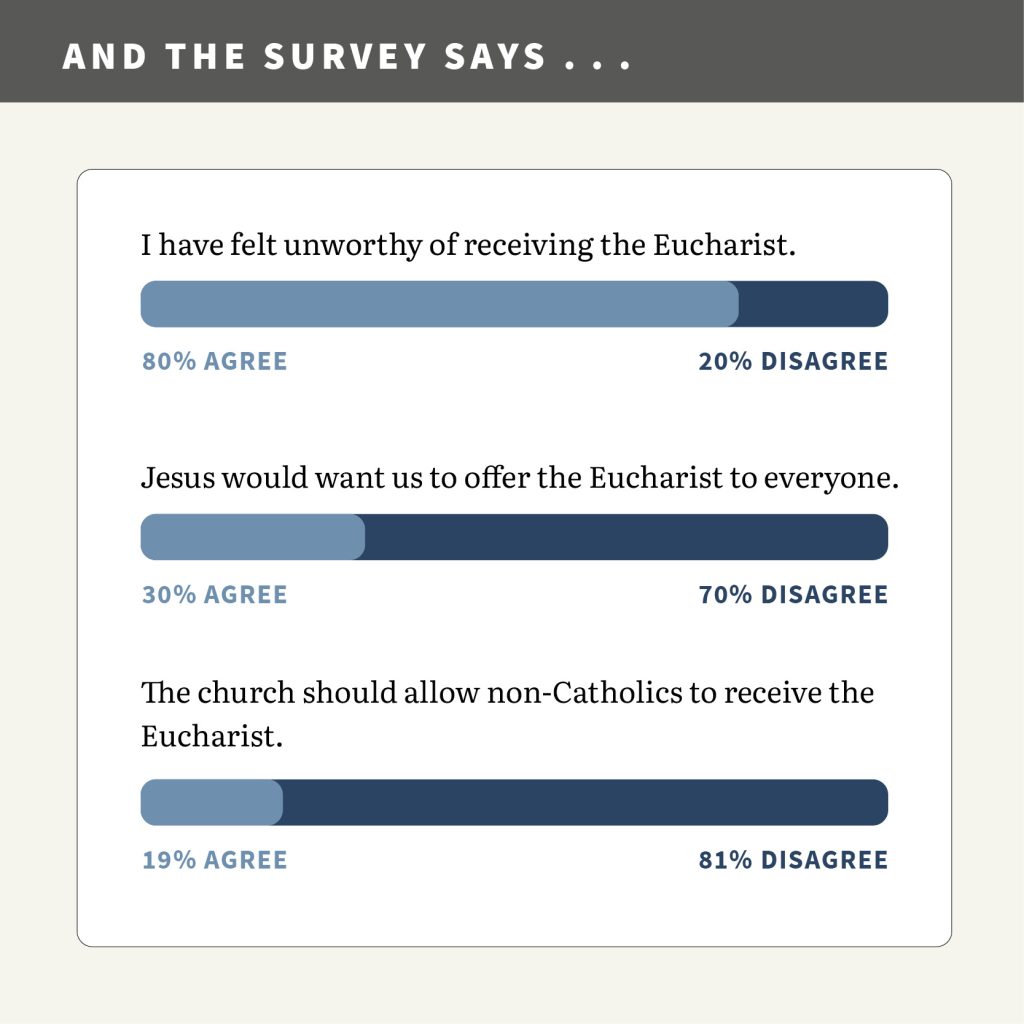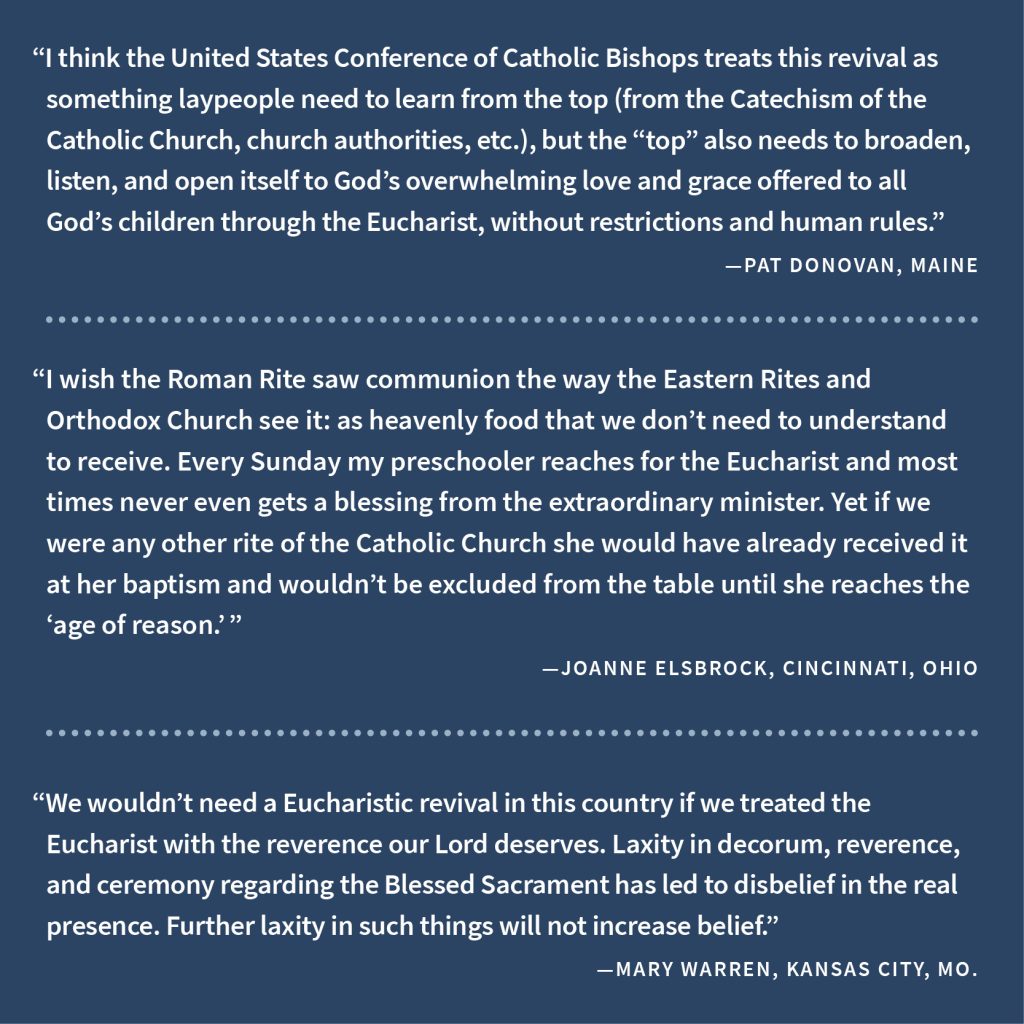For our Sounding Board column, U.S. Catholic asks authors to argue one side of a many-sided issue of importance to Catholics around the country. We also invite readers to submit their responses to these opinion essays—whether agreement or disagreement—in the survey that follows. A selection of the survey results appear below, as well as in the July 2024 issue of U.S. Catholic. You can participate in our current survey here.
Once, while volunteering at a local hospital bringing the Eucharist to patients, I had a powerful encounter. I remember walking into a room and immediately feeling the weight in the air. The shades were drawn, and, despite being a bright sunny day, the room was very dark. A thin woman lay in her hospital bed staring into the distance. She had a knit cap covering her head. I anticipated that she might not welcome my presence, as she was clearly burdened with many thoughts. Yet when I introduced myself and gently inquired if she would like to pray and receive the Eucharist, she nodded in acceptance.

I quieted myself and paused in prayer, wondering what scripture might comfort her before receiving communion. In what I now feel was the guidance of the Holy Spirit, I turned the pages back from the normal gospel readings until I found Psalm 23. I slowly and deliberately began: “The Lord is my shepherd. . .” Tears started streaming down her cheeks and continued throughout the prayer. It was a sacred moment to be honored. I’ve never prayed Psalm 23 so reverentially and intentionally.
After the prayer, she received the Eucharist, and we sat quietly together for a few moments. Her expression had changed, and some small burden had been lifted. A week later, I visited her again, only to find her sitting up with the shades open. When she greeted me pleasantly, I didn’t even realize it was the same person until she reminded me I had visited the week before. It was wonderful to see her so transformed, smiling with a warm disposition. We had a nice conversation, prayed, and shared the Eucharist again.
There is much talk today about the “real presence” and “eucharistic revival.” Often this emphasizes reverence for the Eucharist and is accompanied by the promotion of eucharistic adoration, Corpus Christi processions, and other devotions. What can be missed in these practices, which tend toward the impression that the Eucharist is a sacred object, is Jesus’ desire to actively share in the journey of our lives through communion, especially with those suffering, such as the woman I visited in the hospital.
The Jesus we encounter in the Eucharist is the same Jesus we encounter in the Bible; he always seeks out sinners, those suffering or struggling with hardships, and offers to dine with them. What becomes apparent is that we’ve lost a sense of the healing dimension of the Eucharist as well as the understanding that Jesus used meals and food to strengthen and sustain people in their lives’ journey. We need to expand our eucharistic hospitality to emulate that of Jesus, reaching out with the offer to build communion.
In an often-discussed encounter with a Lutheran woman in 2015, Pope Francis offered an insight into the Eucharist. At an Evangelical Lutheran Church in Rome, Anke de Bernardinis asked Pope Francis if she and her Catholic husband could ever share the Eucharist together. After all, she explained, they share their entire lives and their Christian faith. But when it comes to the Eucharist, their sharing is separated, since she is Lutheran and he is Catholic. The pain of this separation was palpable.
Pope Francis ventured a thought rooted in his deep pastoral experiences and insight. He wondered, “Is the sharing of the Lord’s Supper the end of a journey or the viaticum to journey together?” It’s an important question: Is the Eucharist the end toward which we strive or is it food for the journey on our way to the fulfilment of the kingdom of God?
Currently, the church requires that people who receive the Eucharist be baptized and have a proper understanding of what they are receiving.

We should receive it with great reverence and proper disposition. The Eucharist has accrued a meaning that speaks profoundly about the eschatological goal of all our striving as well as the sacredness of Christ.
However, the church today is asking for more. The recent synod document identifying important issues that have surfaced from local dialogues around the world lifts up this imperative: “We need to examine the issue of Eucharistic hospitality (Communicatio in sacris) from theological, canonical and pastoral perspectives in light of the link between sacramental and ecclesial communion. This issue is of particular importance to inter-church couples.”
The synod also pastorally acknowledges, “When we view the Church as the Body of Christ, we understand more easily that the various members are interdependent and share the same life.”
Jesus used food and drink to welcome, forgive, and renew relationships. Consider his first miracle: Not anticipating the beginning of his public ministry, he was nevertheless moved to help a newly married couple offer hospitality in the wedding at Cana. Consider also the life-giving water he offers the Samaritan woman at the well. After multiple marriages and marginalization, Jesus’ hospitality gives her the opportunity to return to the community.
Can we ponder for a moment how we felt when we were strangers, hurting, or “unworthy” and someone welcomed us? Can we put ourselves into the gospel narratives and imagine how Jesus made people feel? How did they feel when Jesus welcomed them when no one else would welcome them? Can our celebration of the Eucharist do the same?
Canonically, part of the issue here is a non-Catholic receiving the Eucharist. In fact, as the synod raised the issue of “inter-church couples,” current canon law requires such a couple to receive permission to get married in the church. While the idea of a legal norm where Catholics are not allowed to marry Christians of other traditions may be troubling to some, the requirement of permission may be an opportunity for a pastoral expansion of the law.
As the church is diverging from the normal course by permitting the couple to get married, could not the church also diverge from the normal course by giving the couple something to strengthen them along their journey? During the required period of preparation, where issues of faith are discussed, could there not also be an option for the couple to request permission to receive the sacrament of the Eucharist? This would allow couples to discern with each other and their pastor/pastoral associate their path within the church. Many would likely choose not to make such a request, since they value their own faith traditions. However, some, like Anke de Bernardinis and her husband, might make such a request. This discernment could be one way the church offers eucharistic hospitality—in a more personal, Christ-like invitation.
In fact, this sense of asking for permission could be expanded to situations beyond ecumenical couples. Perhaps there are other times when an individual can, in all humility, ask for the help that Jesus offers in the Eucharist. Often the stumbling blocks against such a perspective tend to center upon ideas of “worthiness.” Pope Francis, who has said he has never refused Eucharist to anyone, rejects this perspective and says, “Communion is not a prize for the perfect, no? . . . Communion is a gift, a present, the presence of Jesus in his church and in the community. This is the theology.”
While this doesn’t completely speak to the way Jesus sought people out and offered healing along their journey through life, it does recognize how Jesus responded when so many people called out, “Jesus! Have mercy on me!” Pope Francis began his papacy with the image of the church as a field hospital. If that is the model, isn’t it commonplace to offer viaticum to those suffering?

Results are based on survey responses from 545 uscatholic.org visitors.
This article also appears in the July 2024 issue of U.S. Catholic (Vol. 89, No. 7, pages 30-35). Click here to subscribe to the magazine.
Image: Unsplash/Eric Mok














Add comment